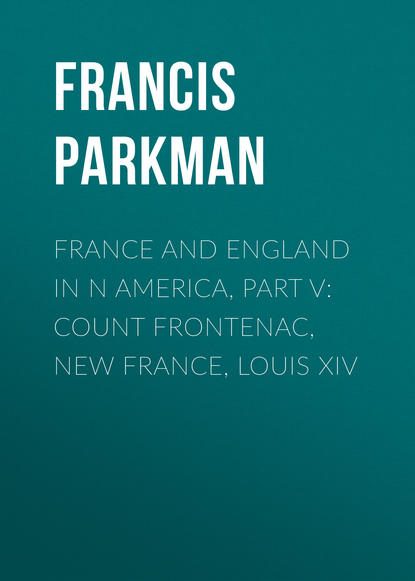По всем вопросам обращайтесь на: info@litportal.ru
(©) 2003-2024.
✖
France and England in N America, Part V: Count Frontenac, New France, Louis XIV
Настройки чтения
Размер шрифта
Высота строк
Поля
404
Villebon, Journal, 1694-1696.
405
N. Y. Col Docs., IX. 613, 616, 642, 643; La Potherie, III. 258; Calières au Ministre, 25 Oct., 1695; Rev. John Pike to Governor and Council, 7 Jan., 1694 (1695), in Johnston, Hist. of Bristol and Bremen; Hutchinson, Hist. Mass., II. 81, 90.
406
Baudoin, Journal d'un Voyage fait avec M. d'Iberville. Baudoin was an Acadian priest, who accompanied the expedition, which he describes in detail. Relation de ce qui s'est passé, etc., 1695, 1696; Des Goutins au Ministre, 23 Sept., 1696; Hutchinson, Hist. Mass., II. 89; Mather, Magnalia, II. 633. A letter from Chubb, asking to be released from prison, is preserved in the archives of Massachusetts. I have examined the site of the fort, the remains of which are still distinct.
407
Mémoire sur l'Entreprise de Boston, pour M. le Marquis de Nesmond, Versailles, 21 Avril, 1697; Instruction à M. le Marquis de Nesmond, même date; Le Roy à Frontenac, même date; Le Roy à Frontenac et Champigny 27 Avril, 1697; Le Ministre à Nesmond, 28 Avril, 1697; Ibid., 15 Juin, 1697; Frontenac au Ministre, 15 Oct., 1697; Carte de Baston, par le S
. Franquelin, 1697. This is the map made for the use of the expedition. A fac-simile of it is before me. The conquest of New York had originally formed part of the plan. Lagny au Ministre, 20 Jan., 1695. Even as it was, too much was attempted, and the scheme was fatally complicated by the operations at Newfoundland. Four years before, a projected attack on Quebec by a British fleet, under Admiral Wheeler, had come to nought from analogous causes.
The French spared no pains to gain accurate information as to the strength of the English settlements. Among other reports on this subject there is a curious Mémoire sur les Établissements anglois au delà de Pemaquid, jusqu'a Baston. It was made just after the capture of Pemaquid, with a view to farther operations. Saco is described as a small fort a league above the mouth of the river Saco, with four cannon, but fit only to resist Indians. At Wells, it says, all the settlers have sought refuge in four petits forts, of which the largest holds perhaps 20 men, besides women and children. At York, all the people have gathered into one fort, where there are about 40 men. At Portsmouth there is a fort, of slight account, and about a hundred houses. This neighborhood, no doubt including Kittery, can furnish at most about 300 men. At the Isles of Shoals there are some 280 fishermen, who are absent, except on Sundays. In the same manner, estimates are made for every village and district as far as Boston.
408
This story is told by Mather, who had it from the women themselves, and by Niles, Hutchinson, and others. An entry in the contemporary journal of Rev. John Pike fully confirms it. The facts were notorious at the time. Hannah Dustan and her companions received a bounty of £50 for their ten scalps; and the governor of Maryland, hearing of what they had done, sent them a present.
409
The reinforcement sent him from Quebec consisted of fifty soldiers, thirty Canadians, and three officers. Frontenac au Ministre, 28 Oct., 1696.
410
On the Newfoundland expedition, the best authority is the long diary of the chaplain Baudoin, Journal du Voyage que j'ai fait avec M. d'Iberville; also, Mémoire sur l'Entreprise de Terreneuve, 1696. Compare La Potherie, I. 24-52. A deposition of one Phillips, one Roberts, and several others, preserved in the Public Record Office of London, and quoted by Brown in his History of Cape Breton, makes the French force much greater than the statements of the French writers. The deposition also says that at the attack of St. John's "the French took one William Brew, an inhabitant, a prisoner, and cut all round his scalp, and then, by strength of hands, stript his skin from the forehead to the crown, and so sent him into the fortifications, assuring the inhabitants that they would serve them all in like manner if they did not surrender."
St. John's was soon after reoccupied by the English.
Baudoin was one of those Acadian priests who are praised for services "en empeschant les sauvages de faire la paix avec les Anglois, ayant mesme esté en guerre avec eux." Champigny au Ministre, 24 Oct., 1694.
411
On the capture of Fort Nelson, Iberville au Ministre, 8 Nov., 1697; Jérémie, Relation de la Baye de Hudson; La Potherie, I. 85-109. All these writers were present at the attack.
412
See note at the end of the chapter.
413
On these negotiations, and their antecedents, Callières, Relation de ce qui s'est passé de plus remarquable en Canada depuis Sept., 1692, jusqu'au Départ des Vaisseaux en 1693; La Motte-Cadillac, Mémoire des Negociations avec les Iroquois, 1694; Callières au Ministre, 19 Oct., 1694; La Potherie, III. 200-220; Colden, Five Nations, chap. x.; N. Y. Col. Docs., IV. 85.
414
Fletcher is, however, charged with gross misconduct in regard to the four companies, which he is said to have kept at about half their complement, in order to keep the balance of their pay for himself.
415
"Si les Outaouacs (Ottawas) et Hurons concluent la paix avec l'Iroquois sans nostre participation, et donnent chez eux l'entrée à l'Anglois pour le commerce, la Colonie est entièrement ruinée, puisque c'est le seul (moyen) par lequel ce pays-cy puisse subsister, et l'on peut asseurer que si les sauvages goustent une fois du commerce de l'Anglois, ils rompront pour toujours avec les François, parcequ'ils ne peuvent donner les marchandises qu'à un prix beaucoup plus hault." Frontenac au Ministre, 25 Oct., 1696.
416
La Potherie, II. 298.
417
La Motte-Cadillac à–, 3 Aug., 1695. A translation of this letter will be found in Sheldon, Early History of Michigan.
418
Relation de ce qui s'est passé de plus remarquable entre les François et les Iroquois durant la présente année, 1695. There is a translation in N. Y. Col. Docs., IX. Compare La Potherie, who misplaces the incident as to date.
419
This last execution was an act of reprisal: "J'abandonnay les 4 prisonniers aux soldats, habitants, et sauvages, qui les bruslerent par représailles de deux du Sault que cette nation avoit traitté de la mesme manière." Callières au Ministre, 20 Oct., 1696.
420
Colden, 178. Fletcher could get no men from his own or neighboring governments. Military Inefficiency of the British Colonies—"His Majesty has subjects enough in those parts of America to drive out the French from Canada; but they are so crumbled into little governments, and so disunited, that they have hitherto afforded little assistance to each other, and now seem in a much worse disposition to do it for the future." This is the complaint of the Lords of Trade. Governor Fletcher writes bitterly: "Here every little government sets up for despotic power, and allows no appeal to the Crown, but, by a little juggling, defeats all commands and injunctions from the King." Fletcher's complaint was not unprovoked. The Queen had named him commander-in-chief, during the war, of the militia of several of the colonies, and empowered him to call on them for contingents of men, not above 350 from Massachusetts, 250 from Virginia, 160 from Maryland, 120 from Connecticut, 48 from Rhode Island, and 80 from Pennsylvania. This measure excited the jealousy of the colonies, and several of them remonstrated on constitutional grounds; but the attorney-general, to whom the question was referred, reported that the crown had power, under certain limitations, to appoint a commander-in-chief. Fletcher, therefore, in his character as such, called for a portion of the men; but scarcely one could he get. He was met by excuses and evasions, which, especially in the case of Connecticut, were of a most vexatious character. At last, that colony, tired by his importunities, condescended to furnish him with twenty-five men. With the others, he was less fortunate, though Virginia and Maryland compounded with a sum of money. Each colony claimed the control of its own militia, and was anxious to avoid the establishment of any precedent which might deprive it of the right. Even in the military management of each separate colony, there was scarcely less difficulty. A requisition for troops from a royal governor was always regarded with jealousy, and the provincial assemblies were slow to grant money for their support. In 1692, when Fletcher came to New York, the assembly gave him 300 men, for a year; in 1693, they gave him an equal number; in 1694, they allowed him but 170, he being accused, apparently with truth, of not having made good use of the former levies. He afterwards asked that the force at his disposal should be increased to 500 men, to guard the frontier; and the request was not granted. In 1697 he was recalled; and the Earl of Bellomont was commissioned governor of New York, Massachusetts, and New Hampshire, and captain-general, during the war, of all the forces of those colonies, as well as of Connecticut, Rhode Island, and New Jersey. The close of the war quickly ended this military authority; but there is no reason to believe that, had it continued, the earl's requisitions for men, in his character of captain-general, would have had more success than those of Fletcher. The whole affair is a striking illustration of the original isolation of communities, which afterwards became welded into a nation. It involved a military paralysis almost complete. Sixty years later, under the sense of a great danger, the British colonies were ready enough to receive a commander-in-chief, and answer his requisitions.
A great number of documents bearing upon the above subject will be found in the New York Colonial Documents, IV.
421
The above is drawn from the correspondence of Frontenac, Champigny, La Motte-Cadillac, and Callières, on one hand, and the king and the minister on the other. The letters are too numerous to specify. Also, from the official Relation de ce qui s'est passé de plus remarquable en Canada, 1694, 1695, and Ibid., 1695, 1696; Mémoire soumis au Ministre de ce qui résulte des Avis reçus du Canada en 1695; Champigny, Mémoire concernant le Fort de Cataracouy; La Potherie, II. 284-302, IV. 1-80; Colden, chaps. x., xi.
422
Relation de ce qui s'est passé, etc., 1695, 1696; La Potherie, III. 279. Callières and the author of the Relation of 1682-1712 also speak of the extraordinary fortitude of the victim. The Jesuits say that it was not the Christian Indians who insisted on burning him, but the French themselves, "qui voulurent absolument qu'il fût brulé à petit feu, ce qu'ils executèrent eux-mêmes. Un Jesuite le confessa et l'assista à la mort, l'encourageant à souffrir courageusement et chrétiennement les tourmens." Relation de 1696 (Shea), 10. This writer adds that, when Frontenac heard of it, he ordered him to be spared; but it was too late. Charlevoix misquotes the old Stoic's last words, which were, according to the official Relation of 1695-6: "Je te remercie mais tu aurais bien dû achever de me faire mourir par le feu. Apprenez, chiens de François, à souffrir, et vous sauvages leurs allies, qui êtes les chiens des chiens, souvenez vous de ce que vous devez faire quand vous serez en pareil état que moi."
423
On the expedition against the Onondagas, Callières au Ministre, 20 Oct., 1696; Frontenac au Ministre, 25 Oct., 1696; Frontenac et Champigny au Ministre (lettre commune) 26 Oct., 1696; Relation de ce qui s'est passé, etc., 1695, 1696; Relation, 1682-1712; Relation des Jesuites, 1696 (Shea); Doc. Hist. N. Y., I. 323-355; La Potherie, III. 270-282; N. Y. Col. Docs., IV. 242.
Charlevoix charges Frontenac on this occasion with failing to pursue his advantage, lest others, and especially Callières, should get more honor than he. The accusation seems absolutely groundless. His many enemies were silent about it at the time; for the king warmly commends his conduct on the expedition, and Callières himself, writing immediately after, gives him nothing but praise.
424
Frontenac au Roy, 25 Oct., 1696.
425
Frontenac au Ministre, 25 Oct., 1696.











